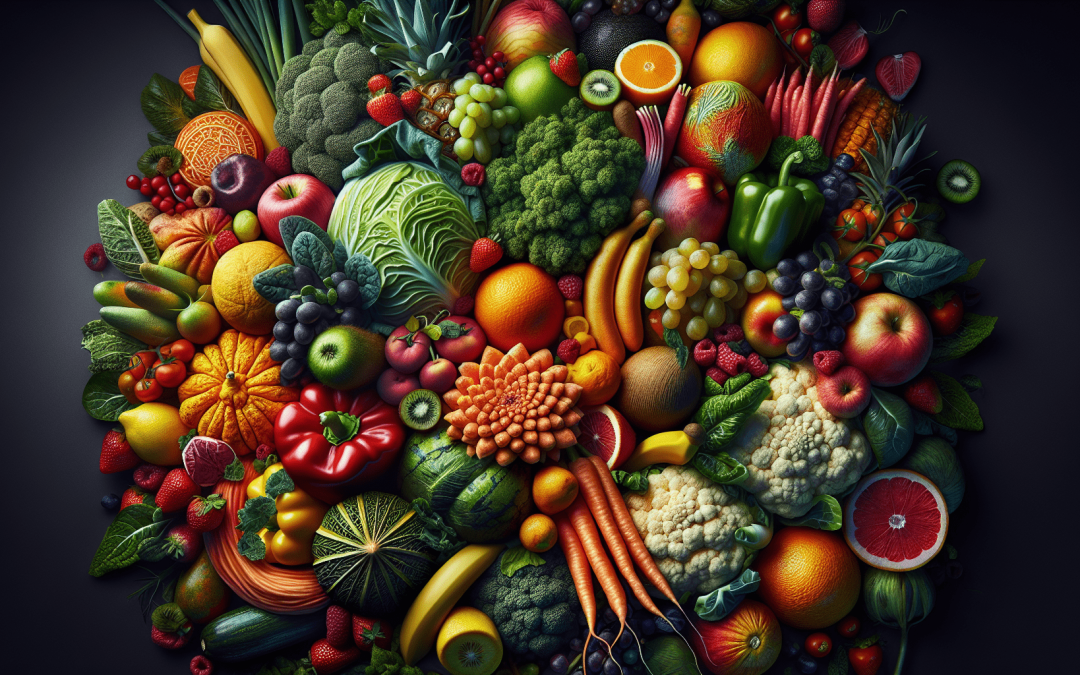The Whole Foods Revolution
Have you ever wondered about the power of nutrition from whole foods? Let’s dive into the world of whole foods and uncover the benefits they offer for your health and well-being.

What are Whole Foods?
Whole foods are foods that are in their natural state, unprocessed or minimally processed, and free from additives and artificial ingredients. These foods are as close to their original form as possible, making them rich in essential nutrients such as vitamins, minerals, fiber, and antioxidants.
Whole foods include fruits, vegetables, whole grains, nuts, seeds, legumes, and lean proteins. By consuming whole foods, you are providing your body with the essential nutrients it needs to function properly and thrive.
Nutrient Density of Whole Foods
One of the key benefits of whole foods is their high nutrient density. Nutrient density refers to the amount of essential nutrients a food contains relative to its calorie content. Whole foods are rich in essential nutrients such as vitamins, minerals, fiber, and antioxidants, making them a powerhouse of nutrition.
When you consume whole foods, you are providing your body with a wide range of essential nutrients that are important for overall health and well-being. These nutrients help support your immune system, boost energy levels, promote healthy digestion, and protect against chronic diseases.
Benefits of Eating Whole Foods
Eating a diet rich in whole foods offers a wide range of benefits for your health and well-being. Some of the key benefits of consuming whole foods include:
- Improved Digestion: Whole foods are rich in fiber, which helps support healthy digestion and prevent constipation.
- Weight Management: Whole foods are naturally lower in calories and higher in fiber, which can help you feel full and satisfied, leading to weight loss and weight management.
- Reduced Risk of Chronic Diseases: Whole foods are rich in antioxidants, vitamins, and minerals that help protect against chronic diseases such as heart disease, diabetes, and cancer.
- Enhanced Energy Levels: Whole foods provide a steady source of energy without the energy crashes that come from consuming processed foods high in sugar and unhealthy fats.
By incorporating whole foods into your diet, you can experience improved health, increased energy, and a decreased risk of chronic diseases.
How to Incorporate Whole Foods into Your Diet
Incorporating whole foods into your diet doesn’t have to be difficult. Here are some simple tips to help you get started:
-
Shop the Perimeter: When you’re at the grocery store, focus on shopping the perimeter where the fresh produce, meats, and dairy products are located. This is where you’ll find the majority of whole foods.
-
Plan Your Meals: Take some time to plan your meals for the week, incorporating a variety of whole foods such as fruits, vegetables, whole grains, lean proteins, and healthy fats.
-
Cook at Home: Cooking at home allows you to control the ingredients in your meals and ensure you’re consuming whole foods. Try to cook from scratch using fresh, whole ingredients.
-
Snack Smart: Choose whole food snacks such as fruits, nuts, and vegetables to keep you fueled throughout the day and prevent unhealthy snacking on processed foods.
By making small changes to your diet and incorporating more whole foods, you can reap the many benefits that come from eating a nutritious and balanced diet.
The Importance of Whole Grains
Whole grains are an essential part of a healthy diet and are a key component of whole foods. Whole grains are grains that contain the entire grain kernel, including the bran, germ, and endosperm. This makes them rich in fiber, vitamins, minerals, and antioxidants.
Some of the most common whole grains include whole wheat, brown rice, quinoa, oats, and barley. Whole grains are a great source of complex carbohydrates, which provide sustained energy and keep you feeling full and satisfied.
Benefits of Whole Grains
Whole grains offer a wide range of benefits for your health and well-being. Some of the key benefits of consuming whole grains include:
- Improved Digestion: Whole grains are rich in fiber, which helps support healthy digestion and prevent constipation.
- Heart Health: Whole grains are rich in soluble fiber, which helps lower cholesterol levels and reduce the risk of heart disease.
- Weight Management: Whole grains are rich in fiber and complex carbohydrates, which can help you feel full and satisfied, leading to weight loss and weight management.
- Blood Sugar Control: Whole grains are slowly digested, leading to gradual rises in blood sugar levels, which can help stabilize blood sugar and prevent spikes and crashes.
Incorporating whole grains into your diet can help you improve your health, increase your energy levels, and support overall well-being.
Tips for Choosing Whole Grains
When selecting whole grains, it’s important to look for products that are labeled “whole grain” or “100% whole wheat.” Here are some tips to help you choose whole grains:
- Look for products with whole grains listed as the first ingredient.
- Avoid products that contain refined grains or added sugars.
- Choose products that are minimally processed and contain the entire grain kernel.
- Experiment with a variety of whole grains such as quinoa, barley, farro, and bulgur for added nutrition and flavor.
By incorporating a variety of whole grains into your diet, you can enjoy the many benefits of these nutrient-dense foods and support your overall health and well-being.
The Power of Fruits and Vegetables
Fruits and vegetables are essential components of a healthy diet and are some of the most nutrient-dense foods available. They are rich in essential vitamins, minerals, fiber, and antioxidants, making them a key part of whole foods.
Fruits and vegetables come in a wide range of colors, flavors, and textures, each offering unique health benefits. By consuming a variety of fruits and vegetables, you can provide your body with the essential nutrients it needs to function properly and thrive.
Benefits of Eating Fruits and Vegetables
Eating a diet rich in fruits and vegetables offers a wide range of benefits for your health and well-being. Some of the key benefits of consuming fruits and vegetables include:
- Increased Fiber Intake: Fruits and vegetables are rich in fiber, which helps support healthy digestion and prevent constipation.
- Improved Heart Health: Fruits and vegetables are rich in vitamins and minerals that support heart health and reduce the risk of heart disease.
- Eye Health: Fruits and vegetables are rich in antioxidants such as vitamin C and beta-carotene, which help protect against age-related eye diseases.
- Skin Health: Fruits and vegetables are rich in vitamins, minerals, and antioxidants that promote healthy skin and protect against skin damage.
By incorporating a variety of fruits and vegetables into your diet, you can experience improved health, increased energy, and a decreased risk of chronic diseases.
Tips for Adding More Fruits and Vegetables to Your Diet
Adding more fruits and vegetables to your diet doesn’t have to be difficult. Here are some simple tips to help you get started:
- Include a serving of fruits or vegetables at every meal and snack.
- Experiment with different types of fruits and vegetables to find ones you enjoy.
- Shop for seasonal produce to ensure freshness and flavor.
- Try new recipes that incorporate fruits and vegetables in creative ways.
By making fruits and vegetables a key part of your diet, you can enjoy the many benefits that come from eating a colorful array of nutrient-dense foods.
The Role of Nuts and Seeds in a Healthy Diet
Nuts and seeds are nutrient-dense foods that are rich in essential vitamins, minerals, healthy fats, and antioxidants. They are a key component of whole foods and offer a wide range of health benefits.
Nuts and seeds come in a variety of shapes, sizes, and flavors, each offering unique nutritional profiles. By incorporating a variety of nuts and seeds into your diet, you can provide your body with the essential nutrients it needs to thrive.
Benefits of Eating Nuts and Seeds
Eating a diet rich in nuts and seeds offers a wide range of benefits for your health and well-being. Some of the key benefits of consuming nuts and seeds include:
- Heart Health: Nuts and seeds are rich in healthy fats, vitamins, and minerals that support heart health and reduce the risk of heart disease.
- Brain Health: Nuts and seeds are rich in omega-3 fatty acids, which are essential for brain health and cognitive function.
- Weight Management: Nuts and seeds are high in healthy fats, fiber, and protein, which can help you feel full and satisfied, leading to weight loss and weight management.
- Bone Health: Nuts and seeds are rich in minerals such as calcium, magnesium, and phosphorus, which support bone health and reduce the risk of osteoporosis.
Incorporating a variety of nuts and seeds into your diet can help you improve your health, increase your energy levels, and support overall well-being.
Tips for Adding More Nuts and Seeds to Your Diet
Adding more nuts and seeds to your diet is simple and delicious. Here are some tips to help you get started:
- Sprinkle nuts and seeds on top of yogurt, oatmeal, salads, or stir-fries.
- Use nut butters or seed spreads as a dip for fruits or vegetables.
- Snack on a handful of nuts or seeds for a quick and convenient source of energy.
- Experiment with different varieties of nuts and seeds such as almonds, walnuts, chia seeds, flaxseeds, and pumpkin seeds.
By incorporating a variety of nuts and seeds into your diet, you can enjoy the many benefits that come from eating these nutrient-dense foods and support your overall health and well-being.
The Importance of Lean Proteins
Lean proteins are an important component of a healthy diet and are essential for overall health and well-being. Lean proteins are proteins that are low in saturated fat and calories, making them a key part of whole foods.
Lean proteins come from a variety of sources, including lean meats, poultry, fish, eggs, dairy products, legumes, tofu, and tempeh. By incorporating a variety of lean proteins into your diet, you can provide your body with the essential nutrients it needs to thrive.
Benefits of Lean Proteins
Eating a diet rich in lean proteins offers a wide range of benefits for your health and well-being. Some of the key benefits of consuming lean proteins include:
- Muscle Building: Lean proteins are essential for muscle growth and repair, making them ideal for athletes and active individuals.
- Weight Management: Lean proteins are low in calories and high in protein, which can help you feel full and satisfied, leading to weight loss and weight management.
- Blood Sugar Control: Lean proteins are slowly digested, leading to gradual rises in blood sugar levels, which can help stabilize blood sugar and prevent spikes and crashes.
- Satiety: Lean proteins are satisfying and help curb hunger, making them an ideal choice for maintaining a healthy weight.
Incorporating a variety of lean proteins into your diet can help you improve your health, increase your energy levels, and support overall well-being.
Tips for Choosing Lean Proteins
When selecting lean proteins, it’s important to choose high-quality sources that are low in saturated fat and calories. Here are some tips to help you choose lean proteins:
- Opt for lean cuts of meat such as skinless poultry, lean beef, and pork loin.
- Choose fatty fish such as salmon, mackerel, and trout for heart-healthy omega-3 fatty acids.
- Experiment with plant-based proteins such as legumes, tofu, tempeh, and edamame for added variety and nutrition.
- Avoid processed meats and products high in sodium, added sugars, and unhealthy fats.
By incorporating a variety of lean proteins into your diet, you can enjoy the many benefits that come from eating these nutrient-dense foods and support your overall health and well-being.
Hydration and Whole Foods
Hydration is essential for overall health and well-being and plays a key role in supporting the benefits of whole foods. Water is vital for digestion, nutrient absorption, circulation, temperature regulation, and waste elimination.
When you consume whole foods, you are getting a significant amount of water from fruits, vegetables, and whole grains. These foods are naturally high in water content and help keep you hydrated throughout the day.
Tips for Staying Hydrated
Staying hydrated is essential for overall health and well-being. Here are some tips to help you stay hydrated throughout the day:
- Drink at least 8-10 cups of water per day to stay hydrated.
- Eat hydrating fruits and vegetables such as melons, cucumbers, strawberries, and oranges.
- Avoid sugary beverages and drinks high in caffeine, as they can dehydrate your body.
- Carry a reusable water bottle with you throughout the day to remind you to drink water.
By staying hydrated and consuming whole foods high in water content, you can support your overall health and well-being and enjoy the many benefits of a diet rich in whole foods.
Conclusion
The whole foods revolution is here, and it’s time to embrace the power of nutrition from whole foods. By incorporating a variety of whole foods such as fruits, vegetables, whole grains, nuts, seeds, and lean proteins into your diet, you can provide your body with the essential nutrients it needs to thrive.
Whole foods offer a wide range of benefits for your health and well-being, including improved digestion, weight management, reduced risk of chronic diseases, and enhanced energy levels. By making small changes to your diet and incorporating more whole foods, you can experience improved health, increased energy, and a decreased risk of chronic diseases.
So why not start your whole foods revolution today and reap the many benefits that come from eating a diet rich in whole, nutrient-dense foods? Your body will thank you for it!
Related Content
- Plant-Based Nutrient Dense Foods for Vegetarians and Vegans
- The Ultimate Guide to 10 Effective Whole Food Protein Sources in 2025
- Top 10 Whole Food Power Meals for 2025: Boost Your Energy Naturally
- Whole Foods for Enhancing Athletic Recovery
- The Ultimate Guide to Whole Food Carbs: 7 Effective Tips for 2025









